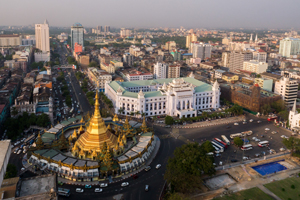
One of the pillars of Myanmar’s democratic transition is its capacity to foster economic development through foreign investments. However, a huge infrastructure deficit combined with electricity shortages are serious concerns for foreign companies willing to operate in this promising new market. As Asia’s second poorest country, Myanmar’s leaders need a reliable foreign investor who has both the financial capabilities and the industrial skills to cope with the challenge. This partner is Japan.
Japan extends a helping hand to Myanmar
In 2013 the two countries signed a framework agreement that opened a new chapter in their bilateral ties. Japan has pledged up to $18 billion in new loans to Myanmar, which covers infrastructure development and development of the Thilawa special economic zone near Yangon. In addition, Japan also announced an aid package for water management and a scholarship program for young administrators. Furthermore, Tokyo will forgive $2.7 billion of Myanmar’s debts. Indeed, this look like the unfolding of a strategic partnership bound to last for decades.
But why did not Myanmar sign such an agreement with the People’s Republic of China (PRC), which has had a close economic and political relationship with Myanmar for several decades? Or with the US, the main sponsor of Myanmar’s democratic transition and opening toward the West? There are four reasons Myanmar chose Japan.
The first reason is Japan’s industrial strength in the eyes of Myanmar’s leaders. The world’s third largest economy is an example of unparalleled industrial innovation and efficiency for Asia’s emerging economies—with Myanmar being no exception. The joint communique released after Japanese Prime Minister Shinzo Abe’s visit to Myanmar in May of 2013 explicitly stresses “the importance of Japan’s technical cooperation for institution development and capacity building of the Government of Myanmar.”
Second, Tokyo kept political and economic cooperation alive for decades, notably through economic development aid—the most important of which is the Japan-Mekong cooperation initiative. Official development assistance programs have been booming in recent years, among the most recent projects is a $25 million grant to Yangon Technological University and Mandalay Technological University. This, along with its “business as usual” approach, makes Japan a trusted partner to Myanmar’s government.
Japan Official Development Assistance, selected countries (net disbursements, million US$)

Source: OECD/DAC
Third, corporate Japan has a regional supply chain that makes investments in Myanmar attractive. From Bangladesh to Thailand to Viet Nam, Japanese multinationals send roughly 80% of exports from their Asian subsidiaries to other Asian countries. Japan’s ANA’s recent acquisition of 49% of Asian Wings Airways highlights the optimistic expectations of the growth of Myanmar’s tourism industry. Mitsubishi Electric is a paradigmatic case. The Japanese industrial giant has been doing business in Myanmar since 1960. In April the company announced that its Singapore-based subsidiary, Mitsubishi Electric Asia, will establish a branch office in Yangon to “coordinate Mitsubishi Electric’s efforts to expand business in Myanmar by conducting market research, collecting information and providing support for infrastructure projects and local distributors.”
Japanese exports, selected countries (increase, million US$)

Source: Ministry of Finance/Trade Statistics
Fourth, Tokyo has been chosen to limit the PRC’s overwhelming economic influence over the country—with $14 billion of foreign direct investments, Beijing is by far the largest foreign investor. Myanmar President Thein Sein is determined to avoid over-dependence on the PRC, which is also not deemed a reliable partner capable of implementing a sustainable industrial development Myanmar strongly needs.
Throughout the last 15 years the PRC’s aid and influence kept rising to a level that now hinders Myanmar’s “quintessential neutralist stance,” as Professor David Steinberg put it. Beijing has established itself as a key trading partner and has gained considerable economic leverage—notably in northern Myanmar and in much of the border region. PRC companies have not only massively exploited resource-rich Myanmar, but also outperformed local businesses—with the PRC central government unable or unwilling to address the issue. As a result, the PRC’s good neighbor reputation faltered and criticism against PRC businesses emerged.
On the one hand, Myanmar needs Japanese industrial expertise to open up its economy. On the other hand, Japan will be granted privileged access to an important market for the decades ahead. This is a win-win situation for both countries.
The Japanese way to doing business in Myanmar
Myanmar is seen as a new market and huge business opportunity for Western and Asian investors, but it presents equally significant challenges. In this regard the Japanese scheme—which combines governmental support through development assistance and political and cultural relations together with private investments and dynamism—is the one to follow for a business to earn lasting rewards in Myanmar.
_____
References:
Fuji, Yasuhide. 2014. Challenges and opportunites in Myanmar. The Bangkok Post.
Ministry of Foreign Affairs of Japan. 2012. Tokyo Strategy 2012 for Mekong–Japan Cooperation.
JETRO. Ministry of Finance. Trade Statistics.
Mitsubishi. 2014. Mitsubishi Electrics to Establish Branch Office in Yangoon.
Kathleen Caulderwood. 2014. Lingering Fears About Myanmar’s Political And Economic Realities May Hinder Direct Investment. International Business Times.
David Steinber. 2013. Japan and Myanmar: Relationship Redux. Center for Strategic and International Studies
Niklas Swanstrom, 2012. Sino-Myanmar relations: security and beyond. Institute for Security and Development Policy







Comments are closed.